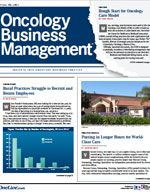Chasing the Holy Grail of EHR Interoperability
COTA Inc, an independent health care informatics company was founded to build research-grade, real-world data to exponentially improve outcomes and reduce costs—ensuring the right care for the right patient every time.
Stuart Goldberg, MD
When medical records transitioned from paper charts to electronic systems, many of us thought that mounds of lost information would suddenly be made available. We all knew that less than 5% of cancer patients were enrolled in clinical trials, and we hoped that with computerization of patient records, we would be able to tap into a vast source of real-world data to help our patients and our practices. Sadly, most of us have learned that we spend more time typing and less time with our patients—without getting much value from the computer.
My colleagues at the John Theurer Cancer Center (JTCC) realized that valuable information was locked in our electronic health record (EHR). We believed that if we could obtain access to this data, we could find insights that would benefit our patients. It was this recognition that led to the founding of COTA Inc, an independent health care informatics company that builds research-grade, real-world data to exponentially improve outcomes and reduce costs—ensuring the right care for the right patient every time. COTA’s software development teams have built specialized semantic analysis and natural language processing capabilities, allowing us to effectively open up the EHR, extract structured and unstructured information from patients’ electronic records and organize the data. COTA’s system is not dependent on the brand of EHR, just the ability to access the data.
The first major problem we tackled at the beginning of this project was the notion that oncology is very complex. As skilled clinicians, we know what is important for various cancer subtypes, whereas current classification systems fail to embrace the nuances of the disease. For example, to develop treatment plans, we quickly sort our breast cancer patients by tumor factors such as stage, hormone status, and HER2/neu status, as well as patient factors such as age, ECOG performance, BRCA history, and cardiac function. However, traditional EHR systems categorize patients by archaic ICD-9 or ICD-10 terms meant for billing purposes, which fail to capture the vital prognostic details. Searches of most EHR or claims databases lump all breast cancer patients into only a few terms—an inefficient way to store data or find useful insights.
Mining Data for Practice Improvement
Thus, we needed to create a whole new taxonomy for classifying cancer, which we now call the COTA Nodal Address (CNA). With the aid of disease-specific cancer experts at our center and with additional outside guidance from our advisory board, we assembled lists of the important elements for each type of cancer that drive prognosis and treatment decisions. With these lists we then digitized each cancer type. Breast cancer exploded from a few ICD-9 terms to more than 5,000 digital subtypes, each with unique prognostic characteristics. With this data properly sorted, our analysts can now do apples-to-apples comparisons for well-defined subtypes of cancer. With every patient in a cohort having the same characteristics (tumor and patient factors,) we can explore the differences in how our doctors treat them, what works, and how much it will cost. With our patented CNA taxonomy, we are able to minimize biologic variance and expose behavioral variance.Over our first clinical year with COTA (using the CNA taxonomy), we have learned to mine this new data source to improve JTCC’s oncology practice. Regional Cancer Care Associates (RCCA) entered into pilot projects with Horizon Blue Cross Blue Shield of New Jersey, exploring value-based, bundled payment arrangements. Using the COTA data source, we retrospectively reviewed the types of patients evaluated at our centers, the types of treatments, the clinical outcomes, and the financial costs of care to inform our administrators in accurate contracting. We used the COTA system to understand how each of our satellite offices was performing and how individual doctors varied in their care of common tumor subtypes. We have benchmarked our practices in real time against national standards to increase the quality of our care, and we are searching for the variances that hide opportunities for improvement.
Value-based advances uncovered by research-grade, real-world data are limited only by our imagination, unlike the insights obtainable from the few patients enrolled in clinical trials. With COTA, the record of every cancer patient’s journey can contribute to our understanding of the treatment of this disease. Additionally, the financial analysis of this well-characterized data can help our practice and others eliminate waste so we can all deliver rational—not rationed—medical care in a value-based system.




